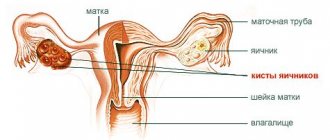Fetus
The 5th week of pregnancy is significant in terms of fetal development. It weighs only 3.5 g and looks like a tube 4-7 mm long rolled into an arc, but not only the head and tail are visible, but also other parts of the body and organs: the rudiments of arms, legs, fingers, eyes, mouth and nasal slits are visible , ears, the upper respiratory tract, liver and pancreas begin to form.
At week 5, partial closure of the neural tube occurs, from which the spine, spinal cord, brain and the entire central nervous system will form. This is facilitated by the mother taking folic acid. It is very important to protect yourself from stress during this period; every experience can affect the baby. On days 20-22 after conception, just this week, the small primitive heart makes its first beats.
The first blood vessels of the embryo are formed, and it itself is surrounded by amniotic fluid: from the 5th week, the metabolism between the mother and the unborn child is established, now you are fully responsible for it, and it depends entirely on you, your nutrition, mood, actions.
Interestingly, it is already possible to determine the blood type of the fetus. And in the 5th week of pregnancy, gonads, eggs and sperm are formed - the sex of the unborn child was determined at the moment of conception.
Uterus
From this week, the uterus begins to noticeably increase in size, although this is not yet visible from the outside. Now it is shaped like an egg and can protrude from the side of the fertilized egg, that is, it increases asymmetrically. Gradually, from elongated it will become spherical. At week 5, the uterus has already enlarged enough for an experienced gynecologist to be able to detect these changes by touch and predict the development of pregnancy.
Nyani.ru - babysitter for a child - - List of conferences
| Nyani.ru - nanny for a child... |
| HOUSE STAFF SEARCH AND SELECTION AGENCIES |
| Domashny Krug domestic staff agency has been working for you for 18 years. Call: +7 | Nanny agency "Comfort" Looking for a nanny? Call: +7 | Selection of domestic staff - "Capital" Only proven nannies! Call: +7 | Recruitment agency "Nanny" Finding a nanny becomes easier! Call: +7 |
| Available conferences | ||
| Pregnancy, childbirth | Messages: 10377 | Last message: 04-21-20 20:12 |
| Baby food | Messages: 1163 | Last message: 10-31-15 06:06 |
| Women Health | Messages: 2129 | Last message: 01-23-20 18:08 |
| Child's health | Messages: 5574 | Last message: 01-27-20 13:15 |
| Nanny : Private advertisements | Messages: 6912 | Last message: 03-18-20 10:04 |
| General conference | Messages: 0 | Last message: |
| Vacation with children | Messages: 84 | Last message: 08-17-16 14:54 |
| Child development and upbringing | Messages: 138 | Last message: 09-16-17 16:14 |
| Maternity hospital in Moscow | Messages: 3349 | Last message: 01-10-18 12:27 |
| Legal advice | Messages: 1543 | Last message: 11-09-15 16:17 |
Site support
Ultrasound at 5 weeks of pregnancy
An ultrasound scan at 5 weeks of pregnancy can accurately determine the size of the uterus and confirm the “diagnosis”. At this time, they will accurately tell you how many fetuses are developing inside you, where exactly they have attached, and will also assess the condition of the uterus and, if necessary, make the necessary forecasts. At the 5th week of pregnancy, during an ultrasound, a good specialist using good equipment can already listen to the first heart rhythms of the embryo - more likely towards the end of the 5th week. The uzologist will use this indicator, together with the motor activity of the fetus, to assess the baby’s vital activity.
At the 5th week of pregnancy, an ultrasound will not yet show the expected weight of the child or other parameters. Instead, the diameter of the amniotic sac and KTP are measured - the coccygeal-parietal size, that is, the length of the embryo from the crown to the coccyx. It is this “growth” of the fetus that will be indicated during the first 20 weeks of pregnancy, and after that it will begin to be measured in full height - from the crown to the heels.
Blood at 8 weeks
Just don't be intimidating, please. I know it's bad.
8 weeks. There was not even implantation bleeding, which everyone experiences. The chest still hurts, the basal pain is the same. NOTHING has changed in the way I feel, only the blood on the napkin in the morning - I already screamed.
Tomorrow I'm going to ultrasound, how will I survive the night?
Girls. Thanks everyone for the advice. I will answer everyone at once:
1. Went for an ultrasound. They set it to 7 weeks and 1 day. Embryo size is 11 mm, heart rate is 140 beats per minute. They told me not to worry - blood happens and no one knows the reason.
2. I'm in Canada. They are NOT stored here. They don't give drugs. Even a gynecologist's appointment starts at 12 weeks. It is believed that if the child does not stay inside, then there is no need to preserve it - this is the way of natural selection. There are no Utrozhestans or others here. There may be, but they are not prescribed.
3. Red-brown blood, drop. And only when I blot it with a napkin - there’s nothing on my panties.
4. In two weeks, have a second ultrasound and if the progress is good, then everything will be fine. Eh. I wish I could live.
5. THE MOST IMPORTANT THING. I came for an ultrasound with the problem of a “red spot”, and left with another problem - the doctor said “a slightly small amniotic sac” - I don’t know what this term is in Russia. Let me explain: when you look at the ultrasound picture, you see a black place where the child is. Well, there wasn't much black space - almost everything was occupied by the child. WHO HAD THIS happen - tell me - they took it out. Can this bag grow?? I'm shocked!!(
Signs and symptoms
The enlarging uterus begins to put pressure on the bladder, so from the 5th week of pregnancy you will start running to the toilet more often. This symptom, together with other signs, may lead a woman to think about a possible pregnancy. And it seems like my period should have started a long time ago... And then my chest hurts, my stomach hurts, and the nausea somehow became stronger, and also the smells are all so pungent...
At the 5th week of pregnancy, taste preferences may change, appetite may increase or disappear altogether, toxicosis often begins to manifest itself, including vomiting - hormones are actively working.
Among the first signs and symptoms at the 5th week of pregnancy, a woman is also worried about headaches, weakness, fatigue, and weakness. She becomes more irritable and inattentive. These signs can appear all together, only selectively or not at all - depending on your luck. But the most reliable and characteristic sign of a possible pregnancy is undoubtedly a missed period: it’s time to take a pregnancy test.
Features of vaginal discharge
This stage of bearing a child in a pregnant woman is accompanied by the appearance of biological fluid from the vagina, which is facilitated by both physiological and pathological reasons.
The appearance of light discharge or transparent mucus from the vagina, resembling a white liquid in appearance, in the absence of any unpleasant odor, is normal for this stage of pregnancy.
The appearance of this vaginal discharge has a very physiological reason. Such specific changes are provoked by the important hormone of pregnancy - progesterone, which affects the epithelial cells lining the vagina, leading to the fact that glycogen begins to accumulate in them.
In turn, it provokes the active growth of beneficial microbes that normally live in the intimate area. These microorganisms are necessary to maintain optimal microflora and pH.
If enough glycogen is formed, this protects the female body from various infections. A decrease in the concentration of progesterone in the blood during pregnancy is dangerous for the development of many pathologies, including the weakening of local immunity in the vagina. A decrease in such protection contributes to the fact that a pregnant woman may develop adverse symptoms of candidiasis (thrush).
This pathology appears due to the active growth and reproduction of Candida fungi. They develop in the intimate area quite quickly under conditions favorable to their growth.
An important clinical sign of this disease is the appearance of light-colored vaginal discharge, resembling cottage cheese flakes in appearance. The color of such discharge is usually white-beige. When secondary bacterial flora joins, a woman may also develop yellow discharge.
Breast
The changes that begin in the body during the 5th week of pregnancy will certainly affect your breasts. It may just be a slight tingling sensation or an annoying uncomfortable feeling in the mammary glands. It's like there's something there and it's interfering. At the 5th week of pregnancy, your breasts may already itch and hurt, your nipples become especially sensitive, which all together only increases your nervousness.
For some women, nipple halos darken already in the early stages: don’t worry, all these changes are temporary, and when the time comes, they will disappear as suddenly as they appeared.
In addition, a venous network may appear on the chest - this is also normal. But there is good news: from the 5th week of pregnancy, the breasts will gradually begin to round and increase in size - your husband will like it.
Brown and pink discharge
Most often, it is the secret blood that frightens a pregnant woman. At the same time, discharge of brown and pink colors is still classified as bloody. They carry the same danger as bleeding.
- Brown discharge. This color of secretion in the early stages is a basic symptom of ectopic pregnancy with egg rejection. In pregnant women with normal readings in the first trimester, brown ointment may indicate a threat of miscarriage. Olga Kravtsova says that secretion of mucus with rich shades closer to brown can also mean a hematoma of the uterine wall. In the later stages (up to 36 weeks), a thin brown viscous secretion may indicate placental abruption or disruption of its functioning. Very heavy brown discharge after 36 weeks of pregnancy requires hospitalization, as it may signal uterine rupture.
- Pink discharge. According to Olga Kravtsova, in the middle and late stages, a medium-intensity pink secretion may indicate placental abruption.
It must be said that during pregnancy, a woman may experience discharge of various colors and consistencies: white, yellow, green, thick, watery, slimy - and some of them are much more dangerous than bleeding. They may turn out to be a symptom... Although - this is a completely different story, and about this in another article. Be healthy!
Feel
Despite the fact that there can be a lot of signs and symptoms at the 5th week of pregnancy, many women, if they experience them, are more likely to expect a late period. Although, if there was a reason or hope to expect pregnancy, then, as a rule, they observe almost all the symptoms at once.
Feelings during the 5th week of pregnancy can be very different: from happiness and joy to confusion and dejection. But if we talk about physiology, then most likely you will not feel the best. The most noticeable thing is fatigue and weakness, constant drowsiness, sometimes the woman even thinks that she is about to get sick, and the temperature seems to be elevated. This condition is normal in early pregnancy. If toxicosis has already begun to annoy you, then there is nothing left to do but study ways to combat it and be patient - by 12 weeks the condition should improve. However, if you vomit frequently, you should consult a doctor immediately!
If you don’t know about your pregnancy yet, but against the backdrop of the sensations described above you want to sing, cry, break dishes, and the irresistible desire to eat a lemon is replaced by a craving for herring (even though it’s so smelly!), then you can immediately go to the gynecologist - why spend money on buying a test...
Implantation bleeding during pregnancy
Implantation bleeding is a natural occurrence of blood in the early stages of pregnancy. It is due to the fact that the fertilized egg tries to penetrate the walls of the uterus. This type of bleeding is not pathological and is not observed in every woman.
According to statistics, bleeding in pregnant women is quite common. A similar problem affects up to 20% of expectant mothers. In Russia, up to 100 women die every year from bleeding during pregnancy, which indicates the seriousness of the problem.
This type of bleeding received its name due to the fact that the introduction of an egg into the walls of the endometrium of the uterus is called implantation. By damaging tissues and blood vessels, the egg hardens inside the woman’s body, causing bleeding. This process occurs on average on the 8th day; after sexual intercourse, sometimes the process can last up to 12 days. The discharge does not last long, the discharge is observed for 2 hours, no more.
It is important to be able to recognize the signs of implantation bleeding and distinguish it from the onset of menstruation or another type of blood loss.
The following indicates that a woman is experiencing implantation bleeding:
- The presence of unpleasant, but not too painful sensations in the lower abdomen. They are of a pulling nature. Caused by muscle spasms of the uterine musculature.
- A short-term decrease in basal temperature. But this sign is very difficult to track, since the decrease is insignificant and short-lived.
- The bleeding itself is weak, the discharge is often light, creamy in color.
- A woman may feel slightly unwell, accompanied by dizziness, weakness and lethargy. They occur after the implantation of the egg is completed.
- The timing of implantation can be calculated. This will happen on day 10, after ovulation, if the cycle is 28 days.
- Unlike menstruation, this bleeding is short-lived.
- The color of the discharge will not be as rich.
- The amount of such discharge is equal to several drops.
On the subject: Implantation bleeding - what it looks like, how many days it lasts, causes
When an ectopic pregnancy occurs, implantation bleeding is somewhat different. The woman experiences pain, sharp and paroxysmal. Most often, ectopic implantation is immediately accompanied by dizziness and nausea. As the blood passes through the fallopian tube, it will become dark, and therefore the discharge will take on a corresponding character.
If the discharge occurred before or after the specified period. If they are intense, this may indicate the presence of some other disease. In this case, you need to go to a doctor for advice.
Determining implantation bleeding on your own using a pregnancy test is problematic. As a rule, at such early stages of pregnancy it does not give a reliable result and should be done only after the first day of missed menstruation.
There is a more reliable method for determining the presence of pregnancy - this is taking blood and conducting an analysis for the specific hormone hCG. When fertilization occurs, the level of human chorionic gonadotropin in a woman's blood increases. It is actively secreted by the membrane of the fertilized egg. This method of determining pregnancy is very reliable and can be done as early as 6 days after intercourse. However, it will be more reliable after implantation bleeding has occurred.
Temperature at 5 weeks of pregnancy
Weakness throughout the body and drowsiness may be accompanied by an increase in body temperature at the 5th week of pregnancy to subfebrile levels - 37-37.2 C. This is a normal phenomenon associated with the active work of hormones. If your general condition is satisfactory, then a low temperature at 5 weeks of pregnancy should not be a cause for concern. An increase in temperature is considered a sign of pregnancy in the early stages, although it is not observed in all newly pregnant women.
If the temperature rises to high levels, and along with this you observe other signs of a cold (cough, runny nose, headaches, sore throat), then you need to immediately begin to act: be careful, in the first trimester not only medications are prohibited, but also many folk remedies.
5 week pregnancy video
5 week pregnancy photo
Sex
You may notice a change in your libido. Here hormones behave very unpredictably: while for some women the attraction to a man completely disappears, for others this is all they think about all day. If you do not observe any signs that threaten your pregnancy (bloody discharge with nagging pain in the lower abdomen), then do not deny yourself intimate intimacy with your husband. Now the rule applies: everything that does not cause harm and gives pleasure only benefits you and the unborn child.
When spotting is normal
At different stages of pregnancy, spotting will cause concern in the patient, but will leave the doctor calm. Most often this happens in the first trimester.
Week 3. At this stage, light or moderate bleeding is possible, which doctors call implantation bleeding. It is caused by the strengthening of the fertilized egg, which sometimes slightly damages the vessels of the uterine wall. A mild nagging pain in the lower abdomen is considered normal during this period.
Week 4. The egg is finally fixed, which causes an abundant, thick, transparent or slightly whitish secretion - sometimes mixed with blood.
Week 10 Normally, discharge at this stage is thin, watery and odorless. But occasionally a light spotting bloody secretion may appear. It is caused by mechanical microdamage to the walls of the uterus, which become loose by the tenth week. Their damage is possible during a gynecological examination, sexual intercourse or due to erosion of the cervix.
In general, according to Olga Kravtsova, spotting is quite common in the first trimester. It is caused primarily by hormonal changes, too active blood supply to the genital organs with increased sensitivity, as well as loosening of the epithelium of the uterine cavity. In the second and third trimesters, normal bloody secretion occurs much less frequently.
25-36 weeks. More often during this period, the discharge is moderate or abundant, light or white in color with a pronounced sour odor. Bloody clots can sometimes indicate not so much gynecological problems as severe constipation or hemorrhoids.
36-40 weeks. Blood clots secretly signal that the plug will soon come out and labor will begin.
I have a stomachache
It’s another matter if you feel pain in the lower abdomen, as if before your period. They indicate increased uterine tone and the threat of miscarriage. Don't panic, many women experience this in the early stages. But you still need to take care: try to rest more, in a horizontal position, don’t get nervous, stop wearing high heels, and also provide yourself with sexual peace for a while.
Perhaps the source of pain is not the uterus at all, but the intestines: it is precisely this type of pain that intensifies after prolonged sitting and squeezing the abdomen. It is also possible that the pulling pains on the sides of the abdomen are associated with the growth of the uterus and the tension of the muscles that hold it. But if at the 5th week of pregnancy your stomach hurts, like during menstruation, and these pains are accompanied by brown or bloody discharge from the vagina, then we are talking about a threat, and the situation requires the participation of a doctor.
Lower back hurts
Such threatening pain in the lower abdomen may be accompanied by pain in the lower back or back at 5 weeks of pregnancy. In addition, spotting brownish discharge usually appears from the vagina, as if menstruation is beginning.
If a woman does not yet know that conception has occurred, then most likely she will perceive such signs as the beginning of a new menstrual cycle. But if you already know, then don’t delay: pain in the lower back and back at 5 weeks of pregnancy is an alarming sign.
What is the cause of bleeding
Even if you feel well and your pregnancy is going well, remember that some actions can cause bleeding. Surprisingly, even food can sometimes act as such a provocateur. Olga Kravtsova recalled that, for example, citrus fruits increase the tone of the uterus and can thus cause bleeding. In any case, doctors recommend, just in case, during pregnancy to avoid:
- active sports and weight lifting;
- "crazy" sex;
- stress;
- air travel, especially in the first and last trimesters;
- falls.
Lovers of alcohol, tobacco and drugs are also at risk. So, if you have any harmful addictions, try to give them up at least during pregnancy.
Women suffering from chronic diseases are also at risk:
- with cervical erosion;
- with cardiovascular diseases;
- with diseases of the uterus (endometriosis, fibroids);
- with a history of recurrent miscarriage.
” Finally, obstetricians and emotionally labile women are also concerned. True, 99% of pregnant women, and indeed all women on the planet, can be placed in the latter category. So the phrase “calm, just calm” becomes more relevant than ever, especially in a situation where spotting turns out to be not a terrible symptom, but an ordinary, normal physiological phenomenon.
Bleeding
If you have stomach and back pain at 5 weeks of pregnancy, and suddenly vaginal bleeding begins, then there is no doubt that this is an incipient miscarriage. You need to go to the hospital urgently in any case: both if you want to continue the pregnancy, and if for some reason you do not do this. You must understand that a favorable outcome depends on how you now react to bleeding at 5 weeks of pregnancy. The chances of saving it are 50/50.
Please note that the risks of miscarriage at 5 weeks are especially increased in women with high levels of male hormones (with a masculine physique, increased body hair growth or excess weight) - it is recommended that they register as early as possible.
Menstruation at 5 weeks of pregnancy
However, the onset of bleeding is not always associated with termination of pregnancy. More than 20% of pregnant women continue to menstruate in the first months. There is a lot of debate about this, and this spotting is called differently, but the fact remains a fact. Sometimes a woman finds out about her pregnancy already at 4-5 months precisely for this reason: every month on the date of her expected menstruation she experiences bleeding, similar to menstruation. In obstetrics, this phenomenon is called “washing of the fetus” or “color pregnancy”.
However, normally, menstruation no longer occurs at the 5th week of pregnancy. This is prevented by the high level of progesterone in a woman’s body.
Spotting or bleeding?
The World Health Organization defines bleeding as any spotting before 22 weeks of pregnancy. In practice, doctors still separate one from the other. Olga Kravtsova says that discharge from bleeding differs according to the following criteria:
Quantity. The unit of measurement is panty liner. If you need more than one, the discharge can already be considered bleeding.
Color. A rich bright red color indicates the beginning of bleeding, dark red indicates that the bleeding is ending, and brown indicates that it has ended.
Discharge
So, we found out that any spotting during the 5th week of pregnancy is not normal and should attract attention. Spotting brownish discharge warns of the threat of termination of pregnancy, bright red bloody discharge of varying intensity warns of an incipient miscarriage. In this case, you must consult a doctor!
You should also tell your gynecologist if you notice strange or unusual vaginal discharge. Yellow, green, grayish discharge can be a sign of infections and sexually transmitted diseases. If at the same time they cause you obvious discomfort - itching, burning, swelling and irritation of the genital organs - then the fact of the disease is obvious. During pregnancy, thrush often worsens - this symptom is even considered one of the early signs of pregnancy.
However, a change in the nature of discharge at 5 weeks of pregnancy does not necessarily indicate a bad thing. During this period, the amount of leucorrhoea may normally increase. Increased production of vaginal mucus is associated with changes in hormonal levels. Just pay due attention to intimate hygiene, using only natural hypoallergenic products and cosmetics.
Bloody discharge during pregnancy without pathology
During pregnancy (especially in the first month of pregnancy), secretion into the blood can be the result of natural or relatively harmless processes, each of which has its own special symptoms.
Implantation bleeding
Olya, 27 years old: “Hello!
I guess I'm 2 or 3 weeks pregnant and have some pink discharge. Tell me, does this happen or is it the menstruation that was delayed for 2 weeks that begins?” Very often, women mistake the presence of spotting in the 3rd week of pregnancy for their next period. It is worth noting that implantation of the fertilized egg can occur either earlier or later, so slight bloody streaks may also indicate a successful conception.
During this period, brown or red marks on the underwear appear due to the implantation of the embryo into the mucous membrane of the uterus. It turns out that it is minor damage to the blood vessels that causes bleeding in the first trimester of pregnancy. It can be:
- mucous leucorrhoea with bloody streaks;
- small drops of blood on a panty liner;
- brown marks.
See the link for a photo of the discharge during implantation of the embryo into the uterus.
Therefore, in the third week and earlier, such secretion without additional symptoms is considered normal. But still, bloody streaks in leucorrhoea should not be ignored in case of any suspicion.
After visiting a gynecologist
Questions regarding discharge after examination by a gynecologist are quite popular on the Internet:
Anna, 30 years old: “I wasn’t bothered by spotting during my 6-week pregnancy, but after yesterday’s examination by the gynecologist I noticed a couple of red drops on the pad. What to do? Is this a miscarriage?
Bleeding during the 6th week of pregnancy can sometimes occur as a result of micro injuries. Naturally, in such a case, women begin to worry, since it is too late for implantation bleeding. During pregnancy at 6 weeks, spotting may appear due to damage to blood vessels and capillaries by a vaginal sensor or speculum. They will not be systematic, so they will immediately disappear almost on the same day. If you observe such secretions for more than a couple of hours or their intensity increases, then the phenomenon is most likely not related to a doctor’s examination. In this case, you should immediately seek medical help.
After sexual intercourse
Bloody discharge in the early stages of pregnancy after sex is not considered a pathology, but in this case it is better to refuse sexual intercourse and consult a doctor, because you need to accurately determine the cause of its appearance, and whether there is a threat to the fetus. But in most cases, such secretion is a consequence of careless intercourse, so it makes sense to reconsider the positions and adhere to a calmer rhythm. You will find a complete answer to the question: “What does discharge during pregnancy after sex mean?” in one of our articles.
"The Vanishing Twin"
Doctors have found that almost every eighth person had a twin in the womb, whose development stopped at a certain point. Note that this process is very typical for artificial insemination. Here's what women write on forums about this:
Zinaida, 36 years old: “I went through the IVF procedure because I had already lost faith in becoming a mother. Everything was fine, but soon there was spotting at 12 weeks of pregnancy. I went for an ultrasound and found that one of the twins was fading. I hope that everything will be fine with the second child, and the appearance of such secretion will not harm the pregnancy.”
In this case, we advise you to pay attention to additional symptoms that may indicate a similar process in the body:
- cramping pain occurs in the lower abdomen;
- convulsions may occur.
Only a doctor can confirm or refute this condition using an ultrasound. As for the time of secretion, spotting at the 10th week of pregnancy, but not earlier, may indicate a “vanishing twin.”
This phenomenon most often passes without consequences for the health of the woman and the unborn child.
Cold
Thrush affects a woman due to decreased immunity, which occurs in the first weeks of pregnancy. For the same reason, expectant mothers often find themselves defenseless against viral and colds. A cold at 5 weeks of pregnancy is a very undesirable occurrence. You can’t take medications now, and it’s not advisable to get sick: a severe cold may not have the best effect on the child, because right now such important processes in his development begin! So take care of yourself. And at the first signs of a cold, start drinking warm liquid, gargling, and rinsing your nose. But be careful with the remedies: traditional medicine during pregnancy can also pose a danger.
Alcohol at 5 weeks pregnant
If 2 weeks ago you could drink alcohol because you didn’t yet know about pregnancy, and you “got away with it,” but now you need to exclude alcohol from your life. Discussions between scientists, doctors and ordinary people continue on this issue. But the following remains unchanged: the embryo is already connected to you by blood vessels and begins to receive from your body everything that gets there, including alcohol at 5 weeks of pregnancy. Can you calculate a dose that is safe for him?.. Of course, drinking a glass of wine is not a reason for an abortion, but if we are talking about a conscious choice at this time, then we recommend completely eliminating any alcohol. By the way, pharmacists say that even alcohol-based medications are prohibited for pregnant women. But the amount of alcohol there is generally negligible.
Tummy sizes
At this stage of pregnancy, female body proportions do not change much. The size of the abdomen increases slightly. It is impossible to determine from the outside whether a woman is pregnant or not.
At 8 weeks of pregnancy, the expectant mother looks quite normal. Her belly cannot be called large: an increase in the circumference of a woman’s tummy will occur somewhat later, when the baby grows larger . However, in petite and thin women, you can see a slight increase in the lower abdomen.
Most women who have already become mothers note that they did not notice any significant changes in the size of their abdomen at this stage of pregnancy.
At this stage of pregnancy, the size of the uterus is still relatively small. It resembles a large grapefruit.
Nutrition
Nutrition at the 5th week of pregnancy should undergo correction and changes towards health. Changes in appetite and taste preferences will sometimes force you to eat foods that are far from healthy - take this calmly. If it “comes over” you and you want something like this, then don’t worry, set your teeth on edge. But only a very small amount, just to calm the soul and body. In general, your diet should consist of healthy dishes and products: a lot of fresh vegetables, fruits, berries, herbs - but certainly in season. Be sure to make sure that fish, meat, cottage cheese, and milk appear on the table regularly. Get a steamer - it’s simply an irreplaceable thing in a family with small children. Try to eat fried foods as little as possible, and also limit spicy and salty foods so as not to have kidney problems in the future.
Meals during the 5th week of pregnancy must include foods containing folic acid, which must also be taken separately or in combination with other vitamins.
And don’t limit yourself to water – this has long been discouraged for pregnant women.
Questions - answers
I’m 5 weeks pregnant, I’m on a forced diet due to toxicosis. What foods do I need to include in my diet so that my baby doesn’t suffer because of my nausea?
Mommy's diet should include a lot of leafy greens, various vegetable and fruit dishes. If you have an aversion to meat, eat more plant-based protein. Avoid smoked and spicy foods. Instead of frying, steam or simmer. Try not to eat foods that are too cold or hot. Every mother has a way of dealing with nausea, try to find your own and focus on foods and dishes that are pleasant to you.
My pyelonephritis worsened, my temperature and my blood tests were very bad. How dangerous are antibiotics at 5 weeks of pregnancy for a baby?
Any medications during this period can be dangerous for the baby. However, infection and exposure to high temperatures are even more dangerous, so follow all doctor’s orders. In the future, pregnancy monitoring should be very careful to promptly identify possible abnormalities. When planning your next pregnancy, try to treat all chronic diseases before conceiving the baby.
I suffered from ARVI at 5 weeks of pregnancy, there was no fever. Could this affect the baby?
If the temperature did not rise, and the disease itself was not very severe, then the probability of a favorable outcome for the embryo is quite high. Typically, severe infections during this period lead to miscarriages. If the pregnancy develops normally, and no pathology is detected on the ultrasound, there is no need to worry.
According to an ultrasound, I am 5 weeks pregnant; my period started in the morning. Is it dangerous?
Bleeding at this stage of pregnancy may be due to the onset of menstruation, but this is rather an exception. A much more likely cause is termination of pregnancy. If you experience any bleeding during pregnancy, you should go to the hospital to rule out pathology and maintain pregnancy.
Is severe nausea normal at 5 weeks pregnant?
Hormonal changes in the first weeks of pregnancy can lead to the development of toxicosis. The most common manifestation of toxicosis in pregnant women is nausea, especially in the morning. The development of nausea in the 5th week of pregnancy is natural, but you should not try to treat it yourself. If nausea bothers you too much, consult a doctor. He will advise methods of combating this disease.
Analyzes
Usually, at 5 weeks of pregnancy, a woman only learns the news based on the test results. Not everyone runs to the gynecologist immediately after this, and in most cases they are not registered so early yet. But if there is a threat of miscarriage, as well as when registering, tests at the 5th week of pregnancy will be mandatory. These are a general analysis of urine and blood, determination of the Rh factor and blood group, hemostasiogram (blood clotting test), tests to detect infections (HIV, syphilis, hepatitis) and others. If there is an existing threat, a quantitative urine test for hCG may be prescribed.
However, the hCG level can be determined for diagnostic purposes - to confirm pregnancy. Already on the 12th day after conception, the analysis will show an increased concentration of hCG in the blood serum, although by the end of the 5th week in the urine it may already be sufficient to determine pregnancy with a simple home test, but this is not at all necessary.
Another significant analysis in the event of a threat of interruption may be the determination of progesterone levels. This hormone creates favorable conditions for the preservation and development of pregnancy, in particular, it relaxes the smooth muscles of the uterus. When its quantity is reduced, pregnancy is at risk.











